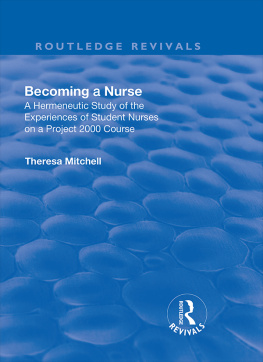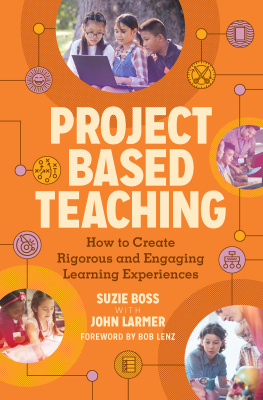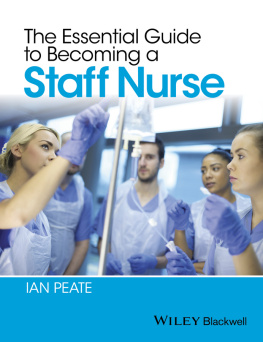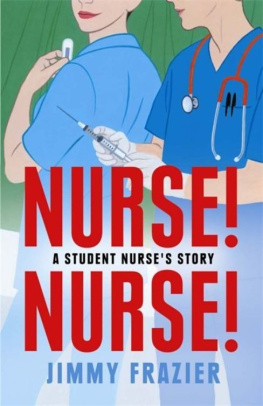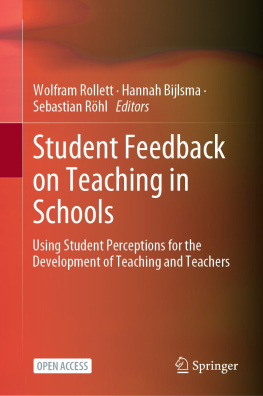Becoming a Nurse
A hermeneutic study of the experiences of student nurses on a Project 2000 course
THERESA MITCHELL
University of the West of England
First published 2002 by Ashgate Publishing
Reissued 2018 by Routledge
Park Square, Milton Park, Abingdon, Oxon 0X14 4RN
711 Third Avenue, New York, NY 10017, USA
Routledge is an imprint of the Taylor & Francis Group, an informa business Copyright Theresa Mitchell 2002
Copyright Theresa Mitchell 2002
The author has asserted her moral right under the Copyright, Designs and Patents Act, 1988, to be identified as the author of this work.
All rights reserved. No part of this book may be reprinted or reproduced or utilised in any form or by any electronic, mechanical, or other means, now known or hereafter invented, including photocopying and recording, or in any information storage or retrieval system, without permission in writing from the publishers.
Notice:
Product or corporate names may be trademarks or registered trademarks, and are used only for identification and explanation without intent to infringe.
Disclaimer
The publisher has made every effort to trace copyright holders and welcomes correspondence from those they have been unable to contact.
A Library of Congress record exists under LC control number: 2001096519
ISBN 13: 978-1-138-72640-6 (hbk)
ISBN 13: 978-1-315-19139-3 (ebk)
Contents
Figures
Considerations for Hermeneutic Analysis
Option 1 - Concept-Led Analysis
Option 2 - Student-Led Biographical Analysis
Option 3 - Methods-Led Analysis
Tables
Summary of Socialisation Studies
Concept of the Person
Significant Dates
Students Constructs of Academic Work in the CFP
Students Constructs of Academic Work in the Branch Programmes
1 Kellys (1955) Fundamental Postulate and Eleven Corollaries
2 Student Questionnaire, February 1994
3 Interview Guide - Student Nurses
4 Guidelines for Present Tense Commentary
5 Model for Structured Reflection (Johns, 1995; Carper, 1978)
6 End of Course Questionnaire
7 Guidelines for Letter Writing
8 Reinharzs (1983) Analysis Framework
9 The Six Most Relevant Corollaries Used to Interpret Data
10 An Example of a Discussion with Colleagues as Part of the Analysis Strategy
11 Themes Generated from Focus Groups with Tutors
12 Themes Generated from Interviews with Practitioners
Becoming a nurse - a hermeneutic study of the experiences of student nurses on a Project 2000 course
The professional socialisation of students into the role of the nurse has been the focus of many research studies, the majority of which assert that individuals pass through a recognised process of becoming. The purpose of this study was to explore the nature and meaning of experiences which enabled students to develop a concept of themselves as a nurse. It uses Heideggers hermeneutic phenomenological approach to gain insight into the unique and common experiences of students.
The methodology constitutes original and creative approaches to data collection and analysis. Eight students development and changing constructs were captured at seven data collection phases over a three year period. Focus groups with nurse tutors (N=27) and interviews with practitioners (N=15), provided contextual data against which students stories have been portrayed.
Data were analysed using Reinharzs (1983) framework to identify common and unique experiences. The hermeneutic concepts of intentionality , thrownness, being-in-the-world-with-others,
temporality and active subject illuminate the students experiences.
The research will inform my own practice as a senior lecturer particularly in the areas of student supervision, student reflection, student development, teaching and leadership skills and in strategies to enhance student confidence when dealing with dying patients and bereaved relatives.
The research contributes to both ongoing discussions in the literature related to socialisation theories and to the qualitative methodology literature.
During the last decade, nurse education has undergone radical changes in order to meet the healthcare demands of future generations. The realisation that traditional nurse training would be inadequate to meet the various healthcare requirements resulted in the development of nurse education curricula with the intention of preparing knowledgeable, skilled practitioners. Historically, nursing has been renowned for its dependence upon the medical profession and a poorly defined, unique body of knowledge. Indeed, French (1992) proposed that in the past, pre-registration preparation for nurses was not an educational experience at all and that it produced trained practitioners who were uncritical replicators of existing nursing practice.
In May 1986 the United Kingdom Central Council (UKCC) for Nursing, Midwifery and Health Visiting published its proposals for the reform of nurse education under the title Project 2000 - A New Preparation for Practice (UKCC, 1986). Reforms in nurse education had repeatedly called for radical change and this policy document emphasised influential aspects such as demographic changes, emphasis upon community care rather than institutional care and a trend towards preventative health care, as opposed to a more reactionary approach to ill health.
The first colleges and schools of nursing to implement Project 2000 curricula were labelled demonstration districts and these educational institutions recruited student nurses, on the Project 2000 courses, in different areas around Britain. Subsequent evaluations at various times throughout the implementation ensued, with particular reference to the effectiveness of the Courses in producing efficient, knowledgeable practitioners (Bradby and Soothill, 1993; Jowett, Walton and Payne, 1994; May, Veitch, McIntosh and Alexander, 1997; Ramprogus, 1995).
In 1992 students embarked upon the first Project 2000 course in the school where I was a nurse tutor. I had taken part in developmental meetings for the curriculum which had been planned some years before. My role as a nurse tutor meant that I was involved with Project 2000 students from the outset as a teacher of research awareness and nursing theory/practice modules and as an academic tutor responsible for facilitating students writing their assignments. The climate at that time was tense and expectant and people were hopeful for the future but disappointed with what appeared to be a theory-biased curriculum. Many nurse tutors were unable, or not prepared, to undertake roles within the remit of Project 2000 because of the academic demands made upon them and the perception that nursing as such, had been lost within academia. This resulted in several tutors in my work area leaving nurse education posts. From a personal perspective I found the challenge exciting, stimulating and rewarding and enjoyed participating in discussions amongst my colleagues. I was also intrigued by students stories relating to tensions in clinical practice and the strategies they would employ in order to be accepted by their qualified counterparts. However, they also expressed that they felt unprepared for practice but demonstrated an overwhelming desire to possess nurse status despite the many obstacles and distractions experienced in the educational and clinical environment. I found some of these stories alarming and became concerned about the general well-being of student nurses who were trying to gain experience within the realms of Project 2000.

